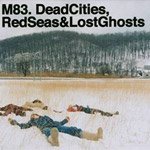
M83 Dead Cities, Red Seas & Lost Ghosts
(Gooom)
Messier Object 83 (or M83): A distant bright spiral galaxy, celebrated for its incredible aesthetic qualities in the world of astronomy.
M83's "Dead Cities, Red Seas and Lost Ghosts": Not so distant French duo create scintillating second album, which should be celebrated for its ethereal and absorbing qualities in the world of electronica.
Now, I'm not trying to say that Dead Cities is the soundtrack to a spiral galaxy, but it could certainly be comparable in terms of capturing the imagination of its admirers; listeners in this case, as opposed to astronomers. As the first track begins, the sound of birds reaches our ears, along with a distorted robot speaking, "Sun is shining, birds are singing, flowers are growing, clouds are looming and I am flying", accompanied with undulating synth strings. After that introduction, we are suddenly thrown head first into the album's first full track, Unrecorded. Here, M83 take the best thing about dance and trance music, but rid themselves of its tackiness. M83 take the kind of familiar arrangements you're likely to hear in the music that emanates from speeding cars filled with baseball-capped partisans, and reinterpret them, utilising warm and rich synth sounds, guitars, and a whole host of slow-tempo drum machines.
In Unrecorded we are treated to buzzing organs and whirring robot sounds filtered across our speakers. At the beginning of the song, space is occupied by continually built-up layers sound. Half way through, we are suddenly given space again, and unpredictably, this is the space we need as the song plays out. Not dissimilar to Christian Fennesz's amazing blending and manipulating of guitar layers, this music feels strangely organic, especially when you consider the fact that mainly synths are used.
The glorious Run into Flowers provides proof that any My Bloody Valentine comparisons the group have received are certainly accurate, with its continual build up of drums, and the obligatory 'is-that-a-woman-singing-or-is-it-a-synth' confusion. Either way, it sounds amazing. The best part of the song, however, arrives midway through; after the initially incessant layering of sound, we are again given space, only to be absorbed for a second time by the gradual crescendo of angelic falsettos, cellos and a dozen other things. So yes, the MBV comparisons may be precise, but in the way that My Bloody Valentine used guitars to create emotion, a largely familiar instrument, M83 frequently make use of the unusual to forge their emotion.
In Church is another track which sees M83 somehow filling breadth and depth with pure sound. This time, cinematic organ is layered together with harmonising vocals and backwards melodies. Buzzing synth builds up during the middle section, only to disintegrate back into organ, which in time fades into the distance. It remains a mystery as to how the duo creates a sound which encompasses the intensity of a rock band, yet retains the fragility and emotion of a folk singer. And as In Church leaves us behind with calm elation, America abruptly begins, its faster, pulsating rhythm reminding us of the dance influence underpinning the duo's music.
Throughout the album, the songs display a beautiful ambience, contrasting superbly with their heavier side, the abrasive white noise and distortion. The fact that these aspects are constantly kept in balance intensifies the music greatly. As the closing song, Beauties Can Die commences, we are treated to childlike vibraphone and angelic female singing. This fragile and delicate opening builds gradually until a peak of harmonising envelops the listener, only to fade out to nothingness. As this beauty does indeed die, silence prevails, leaving us isolated. But after a minute or two, glorious yet melancholic synthesisers and rushing white noise leave us on an unexpected sad note, reflecting of the beauty, and the fact that our idylls are constantly short term and under threat.
In Dead Cities, Red Seas & Lost Ghosts, M83 have created an ethereal electronic masterpiece, and one which, thankfully, doesn't sound like a relic from the Warp Records back catalogue. There is something intensely human about these twelve tracks, perhaps due to the fact they are all so fearlessly down to earth in nature; of course, this is somewhat ironic when you consider the spatial atmosphere which resonates throughout every composition. And, ultimately, there are no delusions; as beauty fades, a false sense of security disintegrates, and we are left again with silence.
30 November, 2003 - 00:00 — Neil Insh